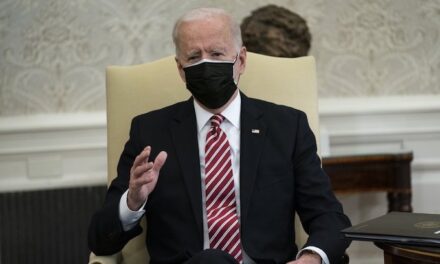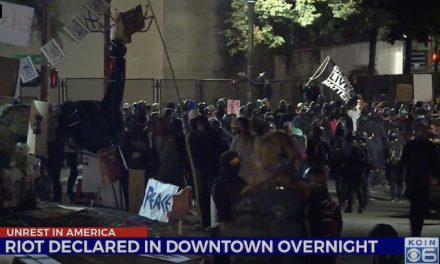A group of Chicago civil rights attorneys signed a letter to Mayor Lori Lightfoot Wednesday asking her to withdraw an ordinance introduced in September which aims to allow the fining of gang members and gives police the authority to seize their property.
The proposal, called the “Victims’ Justice Ordinance,” was introduced as Lightfoot is under pressure to crack down on Chicago’s gun violence and high homicide rate. It was expected to prompt legal challenges from civil rights attorneys and social justice organizations, who believe the measure could wrongly accuse Black and Latino residents of being involved in gang activity.
The letter says that the proposed law will cause the city “costly litigation and perpetuate racial disparities in law enforcement practices” and “it will not reduce harm and violence” in the city.
“We regularly represent Chicagoans who bear the brunt of CPD’s unlawful, racist policing,” the letter says. “Our clients don’t just want to be free from state violence — they want to live in safe, healthy, thriving communities. But for the reasons described further below, the Victims Justice Ordinance will only further the inequities that plague our city.”
The ordinance, if approved, could allow judges or court officers to impose fines as high as $10,000 for each offense and seize “any property that is directly or indirectly used or intended for use in any manner to facilitate street gang-related activity.”
It also calls for the seizure of any property that gangs obtained through illegal means such as drug-dealing or other crimes.
“To be very blunt and clear, we are going after their blood money,” Lightfoot said when she announced the proposal.
Asked about criticism of the plan, Lightfoot on Tuesday said her administration needs to do more to “educate the public” about the ordinance.
“There’s a huge profit motive that these gangs have to wreak havoc and commit violence across the city and we want to take that profit motive away,” Lightfoot said. “I think that’s absolutely a tool that we need to be using.”
The mayor said her administration will use money recovered under the act, if it passes, to support victims and witnesses.
Sheila Bedi, one of the civil rights attorneys who signed the letter, said the letter is signed on by attorneys who have often filed lawsuits against the police department and have been responsible for the city spending over half a billion dollars in legal fees and judgements related to police misconduct.
“This is a proposal that will do nothing to stop the harm that our communities are experiencing,” Bedi said. “To the contrary, we’ll add in a whole other layer of harm in it will give the state another tool to use to target our Chicago’s poor black and brown community. … If the mayor wants to avoid the kind of legal liability that the Chicago Police Department has exposed taxpayers to over the years, it will listen to the attorneys that have signed on to this letter.”
The letter from the civil rights bar said that Chicago has a long history of focusing its policing efforts on street gangs, but these practices have led to “significant legal challenges,” and this new ordinance “will likely suffer the same fate” due to its broad language.
The ordinance also gives the city broad discretion to seize any property that it claims is used to facilitate gang-related activity, the letter says, which could cause relatives of police-suspected gang members to have their property taken.
In addition, the ordinance relies on CPD’s gang designations and intelligence, which the letter calls “notoriously inaccurate and racially disparate.”
The letter also cites a study from the Lucy Parson Lab Chicago, which looked at all asset forfeiture by CPD from 2009 and 2015. It found that the department focused on asset forfeiture on the South and West sides of Chicago, targeting Black and poor residents. In addition, the letter also says that there is little oversight over how CPD uses the money collected from asset forfeiture, so the ordinance could create incentives for officers to label people as gang members and take their property because the department would benefit from the forfeitures.
“We urge you to abandon this Ordinance and the failed approach to public safety it represents,” the letter says. “Instead, we hope you will adopt public safety initiatives that invest in and build on the strengths of our communities.”
©2022 Chicago Tribune. Visit chicagotribune.com. Distributed by Tribune Content Agency, LLC.
—-
This content is published through a licensing agreement with Acquire Media using its NewsEdge technology.



















Can’t be bussin’ up on them criminals—that’s not who we are. Uh-huh.
These idiot attorneys are obviously nor practicing law in the name of truth, justice, and the American way. Defiance attorneys as opposed to defense.
Makes you wonder, WHAT College gav them lawyers, their LAW DEGREE!
Well they SOLD the degree. It may be that the student didn’t spend any money on it, but YOU, fellow taxpayer, surely did.
Gang members are not victims. They are criminals.
How nice. But will the Commie Soros bought-and-paid-for DA even bother to enforce the law?
NOpe.. THAT IS WHY any new law they make, won’t do JACK SQUAT, till that DA is himself jailed!!!
“asking her to withdraw an ordinance introduced in September which aims to allow the fining of gang members and gives police the authority to seize their property.
Lightfoot has to withdraw the ordinance to fine gang members because she heads the biggest criminal gang in the city. Hey Lori, where did all those millions in federal Covid dollars go? Did your real hidden actions of money diversion not fine the taxpaying people, and give your thought police new ways and crisis’ to seize the property of THE PEOPLE for the benefit of the party?
“Victims’ Justice Ordinance,”,,,another Democrat lying oxymoronic piece of word salad that takes words that mean something good, then align them and combine them in a manner to mean something bad, and the opposite of what they claim to offer
IF anything, we need to declare OPEN SEASON, on every gang banger, out there..
“Our clients don’t just want to be free from state violence — they want to live in safe, healthy, thriving communities…..” ( So do all the rest of us. )
But isn’t that the function that prisons serve exclusively to their client’s “community”? That custom designed, tax funded, community is waiting to welcome them with open cells. They need only to plead GUILTY.